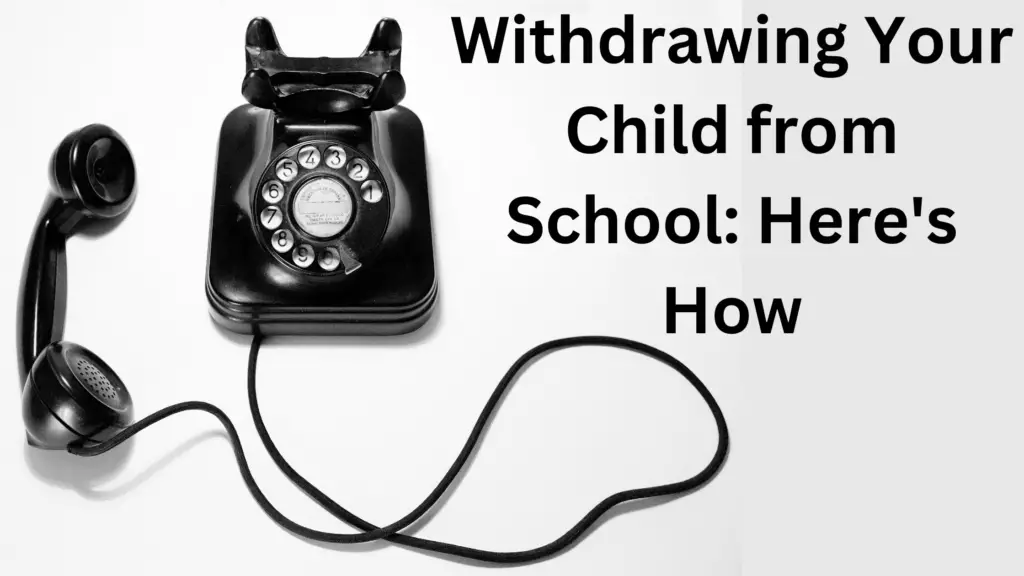As a devoted parent, your commitment to your child’s education and overall welfare is unquestionable. Yet, the journey of parenthood is rife with unforeseen turns, situations that might compel you to contemplate the idea of withdrawing your child from their current educational institution. Whether confronted with an abrupt relocation, intrigued by alternative educational avenues, or gracefully navigating through personal trials, the intricate process of facilitating your child’s withdrawal from school over a phone call demands thorough contemplation and a solid grasp of the procedures involved. In this age where telecommunication penetrates all aspects of life, a pertinent question arises: can I withdraw my child from school over the phone.
Can I Withdraw My Child from School over the Phone
The question at hand – “Can I withdraw my child from school over the phone?” – has a definitive answer: Yes, you indeed have the option to withdraw your child from school over the phone. In certain school districts, this method of withdrawal is permissible and accepted. However, it is worth noting that while withdrawing over the phone is feasible, it is strongly advised to document the process in writing. Whether opting for an email or a physical letter, putting your intention to withdraw in writing is a prudent step. This approach ensures the establishment of a tangible record, which could be invaluable in potential legal scenarios.
Below are the key steps on how to withdraw your child from school over the phone:
- Commence the process by contacting the school office. Request to speak with either the principal or the school registrar. These individuals are typically responsible for handling such administrative matters.
- Upon being connected with the appropriate school authority, communicate your desire to withdraw your child from the school. This upfront communication sets the tone for the discussion and aids in a smooth transition.
- Furnish the school with crucial details pertaining to your child. These include your child’s full name, date of birth, and their current grade level. Accuracy in these particulars ensures a seamless and accurate withdrawal process.
- Clearly state the date on which you wish for your child to be officially withdrawn from the school. This date serves as a marker for the administrative procedures to be carried out.
- Following the conversation, it is prudent to request a written confirmation of the withdrawal. This confirmation can be sent via email or a physical letter. The written document holds substantial importance, serving as a concrete piece of evidence should the need arise to validate the lawful withdrawal of your child from the school.
Read About: Can I Homeschool My Child Temporarily
Understanding the Withdrawal Process
The decision to withdraw your child from school is not a simple one, and the process itself requires thoughtful planning. Withdrawal procedures can vary from one educational institution to another, so it’s crucial to acquaint yourself with your school’s specific protocol.
Initiating the withdrawal process usually entails a formal request, often initiated by contacting the school’s administration office. Schools may have designated forms to complete, which serve as a record of your intent to withdraw. These forms help ensure that both you and the school have a clear understanding of the decision and its implications.
However, the act of completing the forms and making the call is just the beginning. Open communication with the school is paramount during this time. Respectful and clear communication lays the foundation for a seamless transition and minimizes misunderstandings or complications down the line.

School Policies and Communication
Before picking up the phone, take the time to review your school’s withdrawal policies. These policies provide crucial information about deadlines, required documents, and any specific steps you need to follow. Being informed in advance empowers you to engage with the school administration more effectively.
Begin the process by ensuring you have the accurate contact details for the school’s administration office. Make note of the phone number, office hours, and the name of the person you should address when making the call. Having the correct information at hand helps you establish a professional tone from the outset.
During the call, inquire about the documentation required for the withdrawal process. This might include completed withdrawal forms, academic records, and other relevant paperwork. By understanding these requirements beforehand, you can avoid delays and expedite the process.
Ask the school representative about the expected timeline for completing the withdrawal. Understanding the timeline helps you plan the transition effectively and may also impact considerations like your child’s educational continuity.
Part of the withdrawal process may involve settling any outstanding obligations with the school, such as returning textbooks, clearing fees, or addressing other responsibilities. By discussing these matters, you ensure a clean break and uphold a positive relationship with the school.
Before concluding the call, politely request a written confirmation of the withdrawal. This confirmation can serve as official documentation that you initiated the process and can help alleviate any potential disputes in the future.
Legal and Documentation Aspects
Withdrawal procedures can be influenced by legal requirements and regulations in your region. Ensuring that you adhere to these legal obligations is critical.
Research the legal stipulations for withdrawing a child from school in your jurisdiction. Different areas may have distinct regulations, such as notification deadlines or specific forms to submit. Staying informed about the legal aspects helps you comply with local education laws.
Gather all the necessary documentation well in advance. This might include birth certificates, health records, and any other paperwork that the school requires. Organizing these documents streamlines the process and demonstrates your commitment to a smooth withdrawal.
If your child falls under the compulsory education age, you may need to notify relevant educational authorities about the withdrawal. Understanding these obligations ensures you fulfill all necessary legal requirements during this transition.

Clarifying Reasons for Withdrawal
While discussing the withdrawal, it’s important to articulate your reasons clearly and thoughtfully. Sharing your motivations for withdrawing your child can foster a more empathetic and cooperative conversation with the school administration.
Now that you have the answer to query – can I withdraw my child from school over the phone – it is important to be aware that you will have to explain the situation to the school.
Be open about the reasons prompting your decision to withdraw your child from school. Whether it’s due to a family relocation, dissatisfaction with the current educational environment, or personal circumstances, providing context helps the school understand your perspective.
In situations where concerns about your child’s education or well-being are factors in the withdrawal decision, consider discussing potential solutions with the school. They might offer resources, accommodations, or strategies that address your concerns without necessitating a withdrawal. Collaborative problem-solving can lead to positive outcomes for everyone involved.
Following Up and Finalizing the Withdrawal
After your initial phone call, your engagement with the school continues as you finalize the withdrawal process.
A follow-up call or email is essential to ensure that all required documentation and forms have been received and processed. This step minimizes the chances of overlooked details that could potentially cause issues later.
If your child used school materials, textbooks, or equipment, coordinate their return to the school. This act demonstrates your respect for the school’s property and helps finalize the withdrawal process.
If your child will be transferring to another educational institution, communicate with the school about the process for obtaining academic records and any other relevant information. This facilitates a smooth transition and ensures the new school has the necessary information to accommodate your child’s needs.
Read About: What Happens If I Withdraw My Child from School
Considering Alternative Options
As you navigate the withdrawal process, it’s important to consider alternative education options that align with your child’s needs and your family’s circumstances.
If you’re considering homeschooling as an alternative, research the legal requirements and resources available in your area. Homeschooling offers a personalized educational experience but requires careful planning and commitment.
Exploring online schooling options can provide flexibility while maintaining a structured learning environment. Research reputable online education providers and assess whether this approach suits your child’s learning style.
Conclusion
The decision to withdraw your child from school is significant, and the process requires careful thought and planning. By understanding the withdrawal process, adhering to school policies and legal obligations, effectively communicating with the school, and exploring alternative education avenues if needed, you can navigate this transition successfully.







